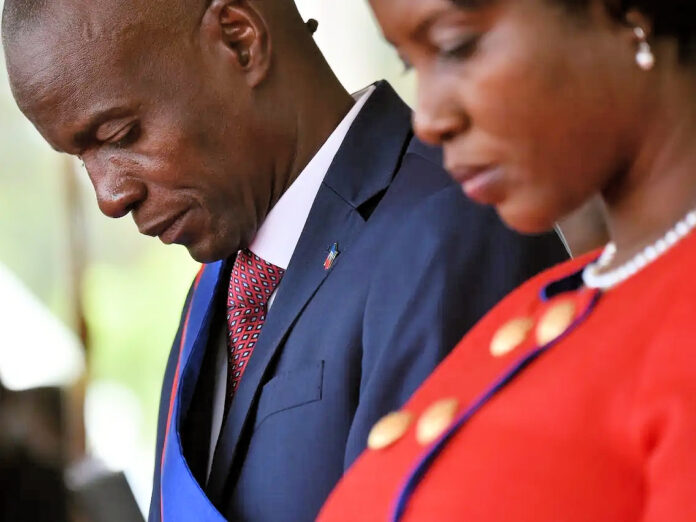
Since the deadly ambush of Emperor Jean-Jacques Dessalines on Oct. 17, 1806, Haiti, in its 218-year history, has never experienced a presidential assassination as brutal and brazen as that of Jul. 7, 2021, when Colombian mercenaries burst into the bedroom of President Jovenel Moïse and fatally riddled him with 12 bullets.
However, the identity of the intellectual authors and financial backers of the intricate, expensive, and heinous crime remains a complete mystery until now, despite the involvement of the FBI and Colombian intelligence service in the investigation and a 122-page report by the Central Directorate of the Judicial Police (DCPJ).

Haitians throughout Haiti and its diaspora almost universally suspect that it was the work from a consortium of Haiti’s ruling class, including businessmen Réginald Boulos and Dimitri Vorbe, who were both at war, politically and legally, with Jovenel Moïse, as well as infamous drug trafficking kingpin, Charles “Kiko” Saint-Rémy, former President Michel Martelly’s brother-in-law and boss. Kiko’s likely involvement in the plot was highlighted in a recent New York Times exposé, which laid out in detail how Moïse was trying to renege on the Faustian bargain with powerful Haitian mafias which hoisted him to power from obscurity in 2017. (Boulos has denied any involvement in the assassination.)
In death, Jovenel Moïse has achieved what he never could in life: winning the Haitian people’s sympathy. Perceived to have been murdered in a plot hatched by Haiti’s powerful, ruthless, and reviled ruling class, the formerly embattled president has become a martyr, and the call of “Justice for Jovenel” is widespread.
Nonetheless, solving the mysteries behind his death appears to be of the lowest priority for Haiti’s ruling circles and Washington. Their focus these days (if the headlines of their subservient media are any guide) is on crushing the autonomous armed popular organizations which have emerged in Haiti’s vast shantytowns, filling the void left by the implosion of Haiti’s central government after years of corruption and marginalization. Some of these armed groups are patently criminal, engaged in kidnapping, extortion, trafficking, and robbery. Facing and fighting them are anti-crime armed groups (an outgrowth of the post-Duvalier “vigilance brigades”), which seek to stop crime in their neighborhoods and demand hospitals, schools, roads, sanitation, and housing. This latter category is represented by the “Revolutionary Forces of the G9 Family and Allies, Mess with One, You Mess with All” (FRG-9), a federation stretching across Port-au-Prince from Carrefour in the south to Cité Soleil in the north.
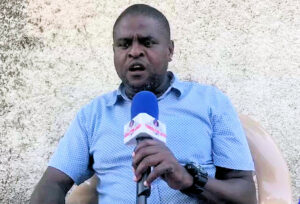
While the Haitian and U.S. bourgeois media conflate the criminal and anti-crime armed groups in an effort to delegitimize the latter, the target of U.S. strategists and their Haitian adjuncts is clear: the FRG-9 and its spokesman Jimmy Cherizier. This became evident in the final weeks of 2021, when the criminal gang and bitter FRG-9 foe, 400 Mawozo, kidnapped 17 North American missionaries for a ransom of $17 million. Nonetheless, the target of U.S. diplomatic condemnation, as well as of U.S. Treasury Department Magnitsky Sanctions, remains Cherizier, who is calling for an armed revolution against the “stinking, rotten” system of Haiti’s “corrupt bourgeoisie.”
Despite his demonization, growing numbers in Haiti and across its diaspora are rallying or sympathetic to Cherizier’s call.
Haiti has often played a vanguard role in history. As the first nation of Latin America in 1804, it provided support and a template for Simon Bolivar’s anti-colonial revolutions on the continent. In 1990, Jean-Bertrand Aristide carried out a political revolution through the polls that Hugo Chavez, Evo Morales, Rafael Correa, and other Latin American leaders used as a model. Today, the armed movement issuing from Haiti’s huge lumpen proletariat, hell-bent on achieving basic human rights, disgusted at the Haitian opposition’s opportunism and hypocrisy, and indignant at Jovenel Moïse’s macabre murder, may set an example for other urban social movements across the planet’s “South.” In late 2019, before COVID-19 threw a damper on densely packed mobilizations, the world’s poor – above all, from the lumpen proletariat – were rising everywhere, from India to Egypt, Chile to South Korea, Indonesia to Ecuador, Algeria to Iraq, Lebanon to Colombia, and the Philippines to Haiti.
In 2022, if Haiti’s revolutionary intelligentsia (or better yet, an organized, disciplined revolutionary party) can gain the trust and join forces with the autonomous “self-acting armed organization of the population,” as Engels would have called it, in Haiti’s slums, the nation founded by history’s only successful slave revolution may once again blaze a path for other peoples to follow.
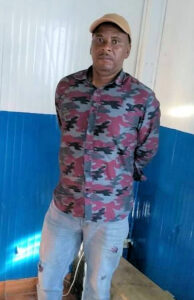
Jan. 2, 2021: The Political Direction of the Democratic Opposition (DIRPOD) writes a letter to United Nations Secretary General Antonio Guterres, bitterly asking that the Integrated Office of the UN in Haiti (BINUH) withdraw its support from President Jovenel Moïse and support it instead.
Jan. 7, 2021: The Haitian government proposes holding a constitutional referendum in April and presidential, legislative, and municipal elections in September and November.
Jan. 15, 2021: Coordinated demonstrations in Haiti and its diaspora call for President Jovenel Moïse to relinquish power on Feb. 7, as stipulated by Article 134.2 of Haiti’s Constitution.
Jan. 21, 2021: Haitian police in Miragoâne briefly arrest opposition leader Nènèl Cassy without charges, sparking outrage and a flash of unity in Haiti’s opposition.
Feb. 1-2, 2021: A successful opposition-backed general strike led by Haiti’s transport unions paralyzes Haiti.
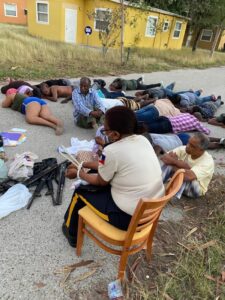
Feb. 7, 2021: Haitian police arrest 23 “coup plotters,” 18 of them in the Port-au-Prince suburb of Petit Bois, on the day that Jovenel Moïse was constitutionally supposed to step down, according to the Haitian Bar Association and Superior Council of the Judicial Power (CSPJ). The detained include Supreme Court Justice Yvickel Dabrésil and Haitian National Police (PNH) Inspector General Marie Louise Gauthier.
Feb. 10, 2021: Long time French activist around Haiti, Holy Ghost Father Jean-Yves Urfié, 83, dies in France of Covid-19.
Feb. 14 & 21, 2021: Tens of thousands demonstrate in Port-au-Prince to demand Jovenel Moïse resign.
Mar. 12, 2021: The Five Seconds gang ambushes and kills five policemen from the PNH’s elite SWAT unit after 12 of the cops in two armored cars penetrate the impoverished Port-au-Prince neighborhood of Village de Dieu.
Mar. 22, 2021: Officer Pierre Mystal Richard of the elite Departmental Unit for the Maintenance of Order (UDMO) is assassinated, prompting the U.S. Embassy to designate the shadowy police paramilitary group Fantom 509 as a criminal organization.
Mar. 28 & 29, 2021: Thousands march through Port-au-Prince to mark the 34th anniversary of the 1987 Haitian Constitution and demand President Jovenel Moïse’s resignation.
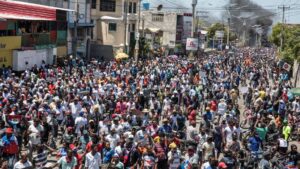
défense face aux initiatives entreprises par le régime en place
Mar. 31, 2021: The U.S. State Department announces that it will provide “technical support” via USAID to the Provisional Electoral Council (CEP) planning controversial polling for a Jovenel-championed constitutional referendum and elections in 2021.
April 12, 2021: Hundreds of high school students across the capital march in the streets against poor conditions and insecurity in their schools.
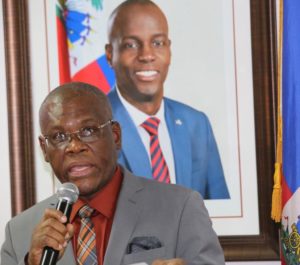
Apr. 13, 2021: Prime Minister Joseph Jouthe abruptly and inexplicably resigns for “personal” reasons. He is replaced by Foreign Minister Claude Joseph.
Apr. 26, 2021: All six Democrats on the House’s Western Hemisphere subcommittee of the Foreign Affairs Committee along with 62 other congresspeople write a letter to Secretary of State Anthony Blinken demanding that he “make clear that the U.S. will not provide any support, financial or technical, to facilitate the proposed Constitutional referendum…”

May 8, 2021: In an online press briefing, the U.S. State Department reiterates its support for elections to planned for September and November, but says it “will not provide financial support for a Constitutional referendum.”
May 14, 2021: President Jovenel Moïse decrees that Claude Joseph will continue as his Prime Minister.
May 15, 2021: Dominican police arrest fugitive Galil Gang-leader Woodley “Sonson La Familia” Ethéart in the Dominican Republic, turning him over to Haitian police the next day.
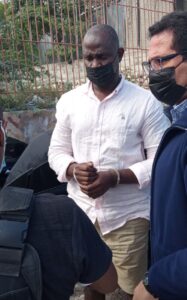
Mid-May, 2021: COVID-19 cases and deaths surge in Haiti, prompting the government to declare a state of emergency.
May 22, 2021: The U.S. restores Temporary Protected Status (TPS) to over 100,000 undocumented Haitians living in the U.S., reversing the Trump Administration’s rescinding of the designation.
May 25, 2021: The Democratic and Popular Sector (SDP) of lawyer André Michel announces its withdrawal from DIRPOD.
Jun. 7, 2021: President Moïse indefinitely postpones the Constitutional referendum, which had already been previously set back from April to June. Meanwhile a one year truce betweens Port-au-Prince armed neighborhood groups is broken when gangs from Martissant, Belair, and Croix des Bouquets begin attacking areas controlled by the G-9 Family and Allies federation.
Jun. 8-10, 2021: An Organization of American States (OAS) delegation visits Haiti to meet with President Moïse and his political opposition.

Palais National le matin du 8 juin 2021
Jun. 17, 2021: Policemen in armored cars from the elite PNH Company for Intervention for the Maintenance of Order (CIMO), with the support of gangs from nearby Belair, Ruelle Maillart, and Rue Tiremasse, fiercely attack the neighborhood of Delmas 6, home to G-9 federation spokesman Jimmy “Barbecue” Cherizier, burning dozens of houses, wounding 20 local residents, and killing four, including a handicapped 8-year-old boy.

Jun. 23, 2021: Changing their name to the “Revolutionary Forces of the G-9 Family and Allies, Mess with One, You Mess with All” (FRG-9), the federation of armed neighborhood groups led by Jimmy Cherizier holds a large march in La Saline, during which they vow to carry out a revolution to overthrow the system headed by Haiti’s “stinking, rotten, corrupt” bourgeoisie. Cherizier also calls for Jovenel Moïse to leave power.
Jun. 24, 2021: Former Haitian President Jean-Bertrand Aristide is taken by ambulance and private jet from his home in Tabarre to a hospital in Havana, Cuba, where he is placed in an ICU. Despite reports that he suffered from COVID-19, he denies it, never revealing the illness that led to his medical evacuation, even after his return to Haiti on Jul. 16, one day after his 68th birthday.
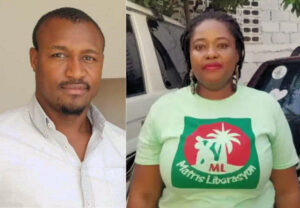
Jun. 29, 2021: Two men on a motorcycle shoot to death Guerby Geffrard, the spokesman for the SPNH-17 police union, in the crowded Port-au-Prince neighborhood of Delmas 32. A few hours later, masked gunmen return to the area and fatally shoot 17 people, including journalists Marie Antoinette “Netty” Duclaire and Diego Charles. The police say the mass shooting was revenge carried out by Fantom 509.
Jul. 1, 2021: The FRG-9 organizes a march of thousands through La Saline toward Cité Soleil, but they are turned back by police gunfire and teargas. Demonstrators demand that “Jovenel must go,” calling for schools, hospitals, sanitation, housing, and food.
Jul. 5, 2021: President Moïse names neurosurgeon Dr. Ariel Henry as Prime Minister to replace Claude Joseph.
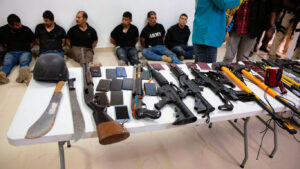
Jul. 7, 2021: Colombian mercenaries, with connivance from Presidential security forces, machine-gun Jovenel Moïse to death in his Pèlerin home, wounding his wife, Martine, and leaving her for dead. After widespread rumors and misinformation about the killing, Haïti Liberté broke the story about how the assassination was actually carried out, based on a source who relayed Martine Moïse’s hospital bed account.

Jul. 20, 2021: Dr. Ariel Henry replaces Claude Joseph as Prime Minister after Washington and its “Core Group” of ambassadors back Henry to end a brief power struggle. It is learned that former Justice Ministry official, Joseph Félix Badio, who remains at large, gave the order by telephone to the Colombian hit team to kill Moïse.
Jul. 21, 2021: Judge Bernard Sainvil shields businessman Réginald Boulos (whom many suspect of involvement in Moïse’s murder) from an inquiry by Haiti’s Unit for the Fight Against Corruption (ULCC), which had sought to investigate $1 million in loans which Boulos had borrowed from Haiti’s National Old-Age Insurance Office (ONA).

Jul. 22, 2021: Washington names diplomat Daniel Foote as its Special Envoy to Haiti.
Jul. 23, 2021: Jovenel Moïse’s funeral is held in Cap Haïtien as police gunshots and teargas quell demonstrators demanding the arrest of those involved in his killing.
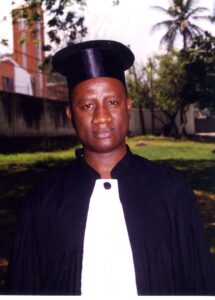
Aug. 9, 2021: Mathieu Chanlatte is finally selected to be the investigating judge in the murder case of Jovenel Moïse.
Aug. 13, 2021: Judge Mathieu Chanlatte quits as investigating judge into Moïse’s murder after receiveing death threats and because his clerk, Ernst Lafortune, was found dead on Aug. 11.
Aug. 14, 2021: A 7.2 magnitude earthquake strikes Haiti’s southern peninsula near Petit Trou de Nippes, killing 2,248 people, injuring close to 13,000, and destroying thousands of homes and businesses.
Aug. 16, 2021: Tropical Storm Grace hits Haiti’s southern peninsula, creating flooding and mudslides and hindering earthquake relief efforts.
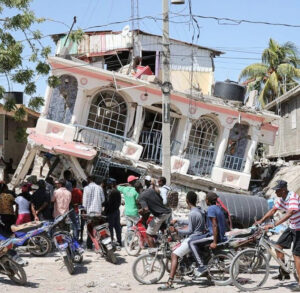
Aug. 20, 2021: Garry Orélien is named as the new investigating judge into Jovenel Moïse’s assassination.
Aug. 30, 2021: Member groups and parties of the Commission Seeking a Haitian Solution to the Crisis (CRSHC) sign an agreement at the Montana Hotel in Pétionville for a provisional government, which becomes known as the “Montana Accord.”
Sep. 10, 2021: Haiti’s chief prosecutor Bed-Ford Claude requests to question Ariel Henry on Sep. 14 about allegations of his involvement in Jovenel Moïse’s assassination. In a tweet, Henry dismisses Claude’s summons as a “diversionary maneuver.”
Sep. 11, 2021: Lawyer André Michel’s leading “radical” opposition front, the SDP, joins with its former nemesis, the ruling Haitian Bald-Headed Party (PHTK) and the social democratic party Fusion, along with others, in signing an agreement drawn up by Prime Minister Ariel Henry, called the “Prime Minister’s Accord.” There are now two dueling coalitions with blueprints for a provisional government.

Sep. 13, 2021: Henry announces the firing of Prosecutor Bed-Ford Claude, Justice Minister Rockefeller Vincent, and Rénald Lubérice, the Secretary General of the Council of Ministers.
Sep. 14, 2021: Prosecutor Bed-Ford Claude calls for Henry to be prosecuted for involvement in Moïse’s murder and issues a travel ban prohibiting him from leaving Haiti. Because he was fired the previous evening, Claude’s orders are moot.
Mid-September, 2021: Some 15,000 Haitians cross the Rio Grande river and mass under a bridge in Del Rio, Texas, trying to enter the U.S.. They are repulsed by U.S. immigration agents on horseback, photos of which shock the world. Some are admitted into the U.S., but most are deported back to Haiti on Immigration and Customs Enforcement (ICE) charter flights, sparking widespread outcry and demonstrations across the U.S..
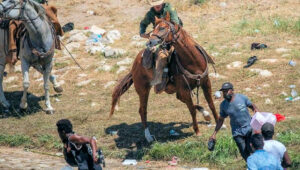
Sep. 22, 2021: U.S. Haiti Envoy Daniel Foote resigns, citing “inhumane” deportations and “catastrophic” U.S. interventions in Haiti.
Sep. 30, 2021: Following Foote’s resignation, U.S. State Department emissaries Brian A. Nichols and Sebastian Gonzales quickly make a two-day visit to Haiti to meet with government officials and the opposition.
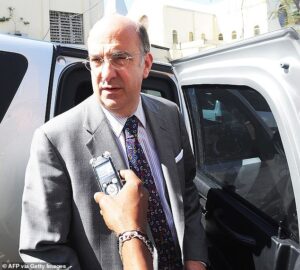
Oct. 12, 2021: Former U.S. Ambassador to Haiti from 2009 to 2012, Kenneth Merten, is reassigned to Haiti as U.S. Chargé d’affaires, replacing outgoing ambassador Michele Sison.
Oct. 16, 2021: The Croix des Bouquets-based gang 400 Mawozo kidnaps 17 North American missionaries from Christian Aid Ministries, demanding a $17 million ransom. Two hostages are released on Nov. 20 due to illness and another three on Dec. 5. The final 12 claim to have escaped “with help from God” in the wee morning hours of Dec. 16 during a guard shift change. Haitians universally regard the whole incident as fishy.
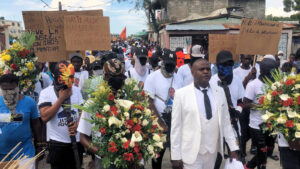
Oct. 17, 2021: On the anniversary of founding father Jean-Jacques Dessalines assassination, the FRG-9 chases off Prime Minister Ariel Henry’s motorcade, and Jimmy Cherizier leads a march of hundreds from La Saline to lay the traditional wreath of flowers on Dessalines’ memorial in Pont Rouge.

Oct. 21, 2021: Prime Minister Ariel Henry fires PNH Chief Léon Charles, after less than one year on the job, replacing him with PNH Inspector General Frantz Elbé.
Oct. 25, 2021: Haiti’s transport unions begin a successful two day general strike against the shortage of gas and rampant insecurity. The same day, PNH officers shoot to death 7-year-old Fodson Michel, who lived in Fort Dimanche near the Varreux Oil Terminal.
Nov. 3, 2021: Haiti’s PM Ariel Henry meets with Dominican President Luis Abinader concerning tensions between the two nations. In preceding and following weeks, thousands of Haitians and Dominicans of Haitian descent, even pregnant women, are expelled from the neighboring Dominican Republic.
Nov. 15, 2021: The FRG-9 calls for a “truce of reflection” after three weeks of stopping gas tanker trucks from leaving the Varreux Oil Terminal, unsuccessfully demanding that Ariel Henry step down to be tried for involvement in Jovenel Moïse’s assassination. The shadow of foreign military intervention grows as Kenneth Merten and Daniel Foote explicitly denounce Cherizier.
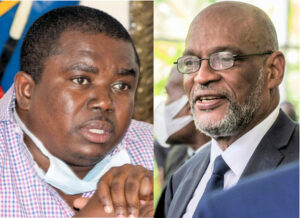
Nov. 24, 2021: Ariel Henry forms a new government in concert with the former opposition groups like SDP, Fusion, and the Dessalines Children party of former Sen. Moïse Jean-Charles.
Dec. 10, 2021: The Haitian government raises fuel prices, further impoverishing crisis ravaged Haitians.
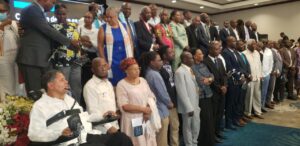
Dec. 12, 2021: Despite some jockeying and false starts, the “Montana Accord” coalition unveils its 43-member National Transition Council (CNT), garnering support from U.S. Congressman Andy Levin (D-MI) and resigned diplomat Daniel Foote.

Dec. 13-14, 2021: When leaking fuel contacts burning trash fires, a gas tanker truck explodes in Cap Haïtien, incinerating over 70 people.
Dec. 21, 2021: Kenneth Merten meets with a delegation from the “Montana Accord” coalition.









